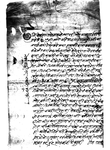A deed executed by Chiriṃ Buṭi of Sāmāgāũ providing for the future emancipation of her female slave Kārto (VS 1949)
ID: L_1200_0016
Edited and
translated by Manik Bajracharya
Created: 2020-03-12;
Last modified: 2020-11-23
For the metadata of the document, click here
The accompanying edition, translation/synopsis and/or commentary are available under the terms of the Creative Commons Attribution-ShareAlike 4.0 International License
Abstract
This is a deed of emancipation executed by Subbenī Chiriṃ Buṭi of Sāmāgāũ in Aṭhāra Saya Kholā. It officializes provisions to free her female slave Kārto, whom she had bought for 35 mohararupaiyās, after the death of her husband.Diplomatic edition
[1r]
1श्री\ [Unknown seal]1लेषकसाछीराइटरवाकाविरश्रेष्ठस्ही¯¯¯¯¯ १1लिषितम्१८सषोलामध्येस्यारपट्टीभोट्सामागाउंवस्न्या2सुव्वेनिछिरिंवुटिआगे•यहिसालगाउमासाह्रोअनिका
3लपर्दाषानावेगर•सवैमर्या•हाम्रापनिघरमा•सावगासनहुं
4नालेअंनषानावेगरमर्नलागीयो•मेरोज्यूदाताभै•तपाञीका
5घरमा•जुनिभरकारिय़ाभैवस्छु•भनिसोहीगाउवस्न्या•छि
6रिंवुटीतोङाकीछोरिकार्तोले•मेराघरमाआइरुंदाकरा
7उंदा•लौभनि•निजकार्तोवर्ष१८उमेरभयाकीषानावेगरमर्नला
8ग्दा•र•निजकीआमा•सानुछीरिंवुटिले•पनिमजुरगरिसाछी
9ग्वाहास्मेत्राषिकागजपत्रगरिदींदा•निजकेटीकोमोल्वदे
10मोर्रु३५निजकीआमा•सानुछीरिंवुटीकाहातमागनिदी•नि
11जकार्तोलाइमानुष्वाइ•काजलाइराष्याकोहोआज•निजके
12टीकोमाञालाग्योर•यस्लाइपारदीन्यैहोभंन्यामे⟪रा⟫चीत्तमा
13लाग्नालेरअरु•२जनालाइपनि•मेराषसमरछोराले
14स्मेत्धर्मगरिछाडेकोदेष्दा•मलाइपनि•छाडीदीउंभंन्या
15लाग्योर•निजकार्तोकरिय़ाहोता•पनि•मेराषसम्काज्यूता
16भरहाम्राचाकडीगरिवस्नुषानु•सेषपछिआफुसुषिभैजा
17हामन्लाग्छ•व़ाहागैषानुवस्नुभनि•धर्मजानिपारगरि
18दीञा•कालकला•हाम्रासन्तान्दरसन्तान्कसैले•करिय़ा
19होस्•भनिकार्तोलाइनपक्रनु•पक्र्योभन्याहाम्रासन्तान्को
20हार•कार्तोकोजित्भनि•मेराषुसिराजिसंग•धर्मजानि
21हाड्चोषोगराइपारपत्रलेषिनिजकार्तोलाइदीञाइती
22सम्वत्१९४९सालमीतीपौषसुदी रोज शुभ्म्
Translation
[1r]
[Unknown seal]
Scribe, witness and writer (rāiṭara) Vākā Vīra Śreṣṭha, signed – 1
Executed by Subbenī1 Chiriṃ Buṭi, a resident of Sāmāgāuṃ towards the Syāra2 side of the Bhoṭ region [and] within [the confines of] Athāra Saya Kholā.
Āge: When Kārto, the daughter of Chiriṃ Buṭī Toṅā3 who is a resident of the aforementioned village, came to my house and lamented, saying: "With the famine occurring this year in the village, all [those] people died due to the lack of food. Since there are no supplies in our house, we too are about to die from hunger. I will be the donor of my own body and will stay in your house as a slave (kariyā) for the rest of my life," I agreed to it. Since the 18-year-old Kārto was about to die without food, and since her mother Sānu Chiriṃ Buṭi agreed to it and signed the deed in the presence of witnesses, I counted out 35 mohararupaiyās and handed them over to the mother, Sānu Chiriṃ Buṭi, as the price of the said slave (keṭī). I have fed and employed her for work [since then]. Today I feel pity for this slave and that I should definitely free her. Having seen my husband and son, too, freeing 2 other persons in the practice of pious act (dharma), I also felt that I should free [her].
Even though the aforementioned Kārto is [still] a slave, I have freed her with the intention of dharma, stating: "She shall serve us and be fed throughout the life of my husband. After [his] death, she may happily go wherever she wants and live according to her own wishes." None of our descendants shall take possession of her in the future, stating: "You are a slave." If anyone takes possession of her, our descendants shall be defeated and Kārto shall be victorious.
I have, with pious intention, willingly freed4 the said Kārto, written this deed of emancipation (pārapatra), and handed it over to her.
...5 day of the bright fortnight of Pauṣa in the [Vikrama] era year 1949 (1892/1893 CE). Auspiciousness.
Commentary
This document in the private collection of Tsering Wangdu in Nubri is a deed providing for the emancipation of a slave posthumously. Issued by Chiriṃ Buṭi of Sāmāgāũ, it frees her slave Kārto on condition that she remains in service throughout the life of her owner's husband. Eighteen-year-old Kārto, with the permission of her parents, sold herself into slavery because the family was unable to support itself due to a famine that occurred in 1892. Another slavery-related document from the same area, E_3446_0032, specifies that the famine occurred in that area during the rainy season of the year.
The document emancipated Kārto from enslavement, but not from servitude. The expression used in this document to free her from slavery, 'hāḍa cokho garāi', is in causative case which might suggest that the emancipation was a separate act, possibly a ritual one. The document E_3446_0032 also uses somewhat similar phraseology suggestive of a ritual uplifting of the slave's caste and rice commensality status.

